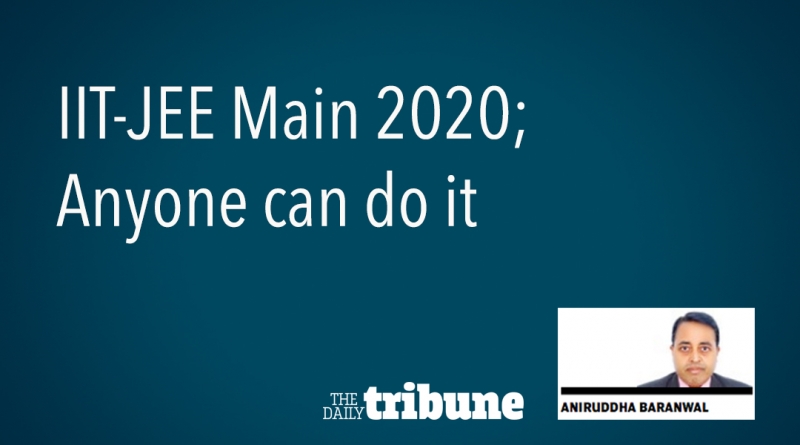IIT-JEE Main 2020: Anyone can do it
JEE Main (and Advanced) happens to be one of the most coveted and toughest examinations across the world for the students of Grade 12 level.
JEE Main is applicable for admissions to NITs, IIITs and CFTI in India. The results will also lead to the students being shortlisted for admissions to IITs and become eligible to appear in JEE Advanced.
The exam conducted by NTA will be held in two phases for admission to B.E. / B. Tech. (Paper 1) and B. Arch. / B. Planning (Paper 2). The first phase will be held from 6th January to 11th January 2020 and the second phase will be from 3rd April to 9th April. Student can appear in both and the best score will be considered. In overseas countries usually only one day is kept for the exam and in Bahrain it happens to be on 7th January 2020.
Though the exam may be the toughest but with right strategies, guidance and determination even an average student can crack it.
Given below are certain general tips and specific tips for those who are going to appear on 7th January:
General tips
•Know the pattern: This year each subject will have 25 questions with 20 questions as multiple choices type with single option correct and 5 questions of numerical answer type. The first 20 questions will have negative marking while the next five questions will have no negative marking. Never attempt questions with negative marking if one is not sure. However, an intelligent guess can be taken if two options can be eliminated.
• Stick to a single system: Do not keep changing books while studying. Follow a single book or study material from a good coaching institute like FIITJEE and complete it.
•Take sufficient mock tests: FIITJEE has a dedicated portal myPat.in for such tests.
•Practice to increase your competence level: While practicing few things must be kept in mind. Treat every objective question as a subjective and solve. Further, try to solve those questions, which you think you cannot solve. Do not use shortcuts in the initial stage and try to solve from the “first principle”. Select questions to practice, which involve multiple concepts like questions on simple harmonic motion. Finally after solving try to solve the same question by other methods or modify the same to make a new question.
• Know the tentative cutoff: In this exam there is no pre-declared cutoff. However, over the years the cutoff has been just around 35 per cent or even less!!!! There is also a minimum cutoff for individual subject for which one can expect roughly 18 to 20pc.
Last moment tips
• Devote time to select questions: Choosing the right question to solve becomes very important. Around first five to seven minutes must be devoted to select the easier questions from all the subjects. And believe me, there will definitely be many. Further, numerical type questions must be attempted, as they do not have negative marking.
• Subject wise tips:
• Chemistry: It is good to start with questions of inorganic chemistry like P and S block and classification of elements and periodicity in properties. They are direct, factual and hence involve less time. Reading NCERT will help.
• Physics: Chapters like Modern Physics, Current and Magnetism are scoring and easier to eliminate few options. Do not ignore topics involving experiments, errors, dimensions and significant figures which are not only scoring but there will definitely be at least one question from this.
• Mathematics: Matrices, Determinants and Quadratic Equations are easier and important.
•Refer to Formulae and Notes: FIITJEE provides formula booklets and notes for the last moment preparations.
• Revise through JEE question Bank: FIITJEE provides subject and chapter wise last 25 years Archives containing JEE questions.
(The author Aniruddha Baranwal is the Vice-Chairman, FIITJEE India WLL and an ex-IITian. He has been guiding CBSE students of Bahrain for the last 12 years for such exams. For more tips and guidance, he can be reached at aniruddha.baranwal@fiitjee.com.
Related Posts

